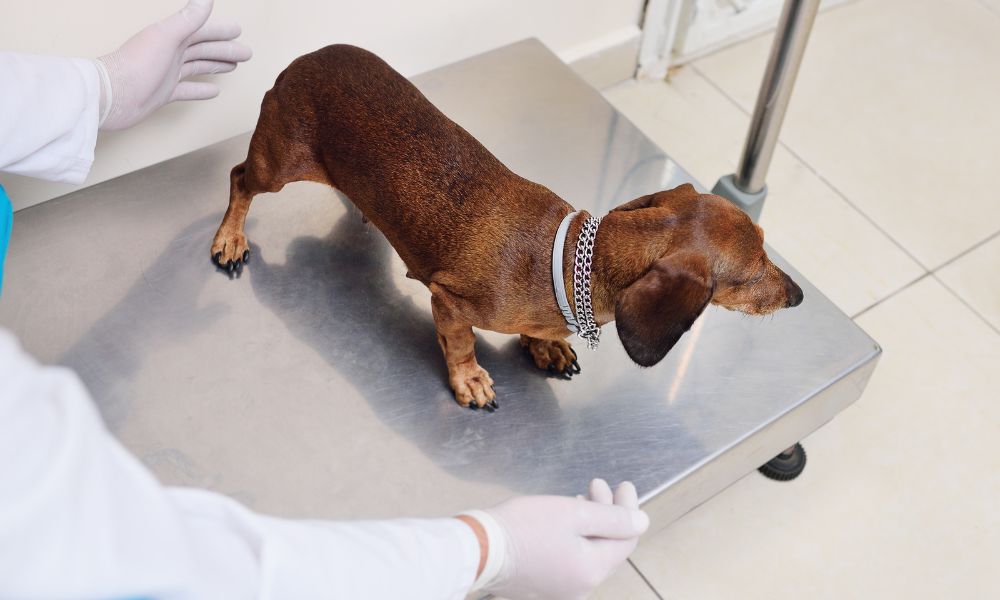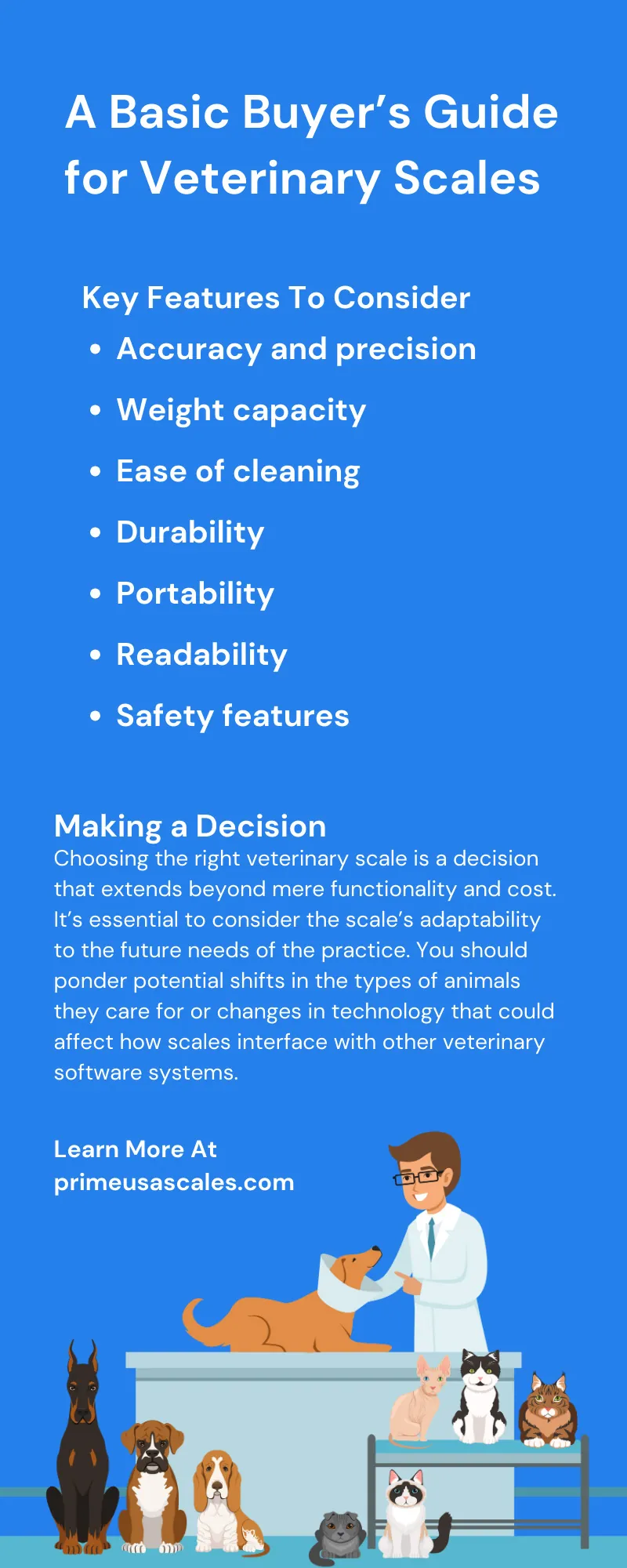
When it comes to managing the health of animals, whether in a veterinary clinic or a farm, one of the essential tools required is a reliable set of veterinary scales. Accuracy, durability, and ease of use are just a few of the critical features that veterinary professionals need to consider when purchasing these indispensable instruments.
Veterinary scales play a crucial role in regular health check-ups as well as medication dosing and nutrition planning. With the wide variety of scales available on the market, proper knowledge will help you choose one that aligns with your business needs.
This buyer’s guide for veterinary scales will help simplify the selection process, outlining key factors and presenting options to help you make an informed decision.
Understanding the Different Types of Veterinary Scales
When selecting veterinary scales, it’s crucial to understand that not all scales are equal. The variety available caters to different sizes, species, and specific uses in animal care. Small, portable scales are ideal for weighing small animals such as cats, birds, and rabbits in a clinical or home setting. These scales often have a smaller footprint, and you can easily transport and store them.
Large platform scales are ideal for bigger animals such as dogs and even livestock. These are typically more robust, can withstand heavier weight, and have safety features for the animals. Floor scales are another category that offers a balance between portability and durability, suitable for a range of animal sizes.
Key Features To Consider
When selecting the right veterinary scale, key features play a critical role in ensuring functionality, durability, and ease of use.
- Accuracy and precision: The primary function of a veterinary scale is to provide accurate and precise weight measurements. Look for scales with high precision, especially for small animals, where even a minor discrepancy can affect medication dosage or health assessment.
- Weight capacity: It’s crucial to choose a scale with a suitable weight capacity for the animals you intend to weigh. A scale’s capacity should comfortably accommodate the animal’s weight to avoid damage to the scale and ensure the safety and comfort of the animal.
- Ease of cleaning: Veterinary scales should be easy to clean and disinfect so that you can maintain hygiene and prevent the spread of diseases. Materials that are resistant to corrosion and have smooth, non-porous surfaces are ideal.
- Durability: The veterinary environment can be demanding, and scales may be subject to frequent use, movement, and even exposure to moisture. Durability is an essential characteristic that allows scales to withstand these conditions, ensuring the scale remains reliable over time.
- Portability: Depending on the practice or the need to conduct home visits, portability might be a significant consideration. Lightweight designs and the presence of handles or wheels can greatly enhance a scale’s portability.
- Readability: The display should be easy to read under various lighting conditions. Large, backlit displays can help ensure that weight readings can be easily and accurately recorded even in less-than-ideal lighting.
- Safety features: Non-slip surfaces and secure footing can help ensure the safety of both the animals and veterinary staff during weighing. Consider scales with edges or barriers for more skittish animals.
With these features, you can make an informed decision, selecting a scale that meets your needs and enhances the overall efficiency and safety of animal care.
The Importance of Calibration
Regular calibration of veterinary scales is essential for maintaining their accuracy and reliability over time. Calibration ensures that scales provide precise readings, which is critical for diagnosing animal health, administering accurate doses of medication, and monitoring weight for dietary adjustments or treatment efficacy.
Without routine calibration, scales can drift from their original settings, leading to errors that could compromise animal care. Calibration verifies that the scales meet industry standards and legal requirements, especially in settings where weight measurements might influence commercial transactions or regulatory compliance.
Integration With Veterinary Software
Integrating scales with practice management software represents a leap forward in automating and streamlining veterinary operations. This integration facilitates the immediate and error-free transfer of a pet’s weight directly into its electronic health record. It saves time during consultations and enhances data accuracy, eliminating the risk of manual entry errors.
Modern veterinary weighing scales equipped with Bluetooth or Wi-Fi capabilities can easily connect to most practice management systems, making them an indispensable part of a technologically advanced veterinary clinic. This connectivity also supports advanced features such as trend analysis and alerts for significant weight changes, enabling proactive health management.
Cost Consideration
While quality and functionality are paramount when selecting veterinary scales, cost consideration is an equally important factor for veterinary practices. Budgeting for a veterinary scale requires careful consideration of both initial purchase costs and long-term maintenance expenses.
Opting for a less expensive model might save money upfront but could lead to higher costs over time due to repairs or replacements. Investing in a high-quality, durable scale with advanced features such as connectivity for electronic health records might have a higher initial cost but can reduce the need for future upgrades.
Environmental Sustainability in Veterinary Practices
Environmental sustainability in veterinary practices encompasses a broad range of initiatives aimed at reducing the environmental footprint of veterinary operations. These efforts may include reducing waste, implementing recycling programs, conserving energy and water, and choosing eco-friendly products and equipment.
A key focus is on minimizing the disposal of hazardous materials, such as certain medications and chemicals, which you must handle with care to prevent environmental contamination. Veterinary practices can also contribute by promoting sustainable pet ownership, including recommending biodegradable waste bags and eco-friendly pet products.
Warranty and Support
The warranty and support offered by manufacturers of veterinary scales are critical factors that can significantly influence a veterinary practice’s decision-making process. A comprehensive warranty not only safeguards against defects and malfunctions but also assures the manufacturer’s confidence in their product’s reliability and durability.
Typically, warranties for veterinary scales can range from one to five years, covering parts, labor, and, in some cases, even include preventive maintenance services. When evaluating warranty options, it’s essential for veterinary practices to understand what the warranty covers and for how long.
Making a Decision
Choosing the right veterinary scale is a decision that extends beyond mere functionality and cost. It’s essential to consider the scale’s adaptability to the future needs of the practice. You should ponder potential shifts in the types of animals they care for or changes in technology that could affect how scales interface with other veterinary software systems.
The scalability of the scale, in terms of both physical size and technological compatibility, ensures that the investment remains valuable even as the practice evolves. Learning from the experiences of others can highlight potential issues or benefits that may not be immediately apparent.
Selecting the right veterinary scale is a meticulous process that influences the foundational aspects of veterinary practice, from precise diagnostics to high-standard treatment. It goes beyond mere numbers on a display; it’s about ensuring accuracy, safety, efficiency, and, above all, the well-being of the animals in care.
Call us today to learn more about our catalog of products, and let us help your business become a leader in pet health and well-being.
